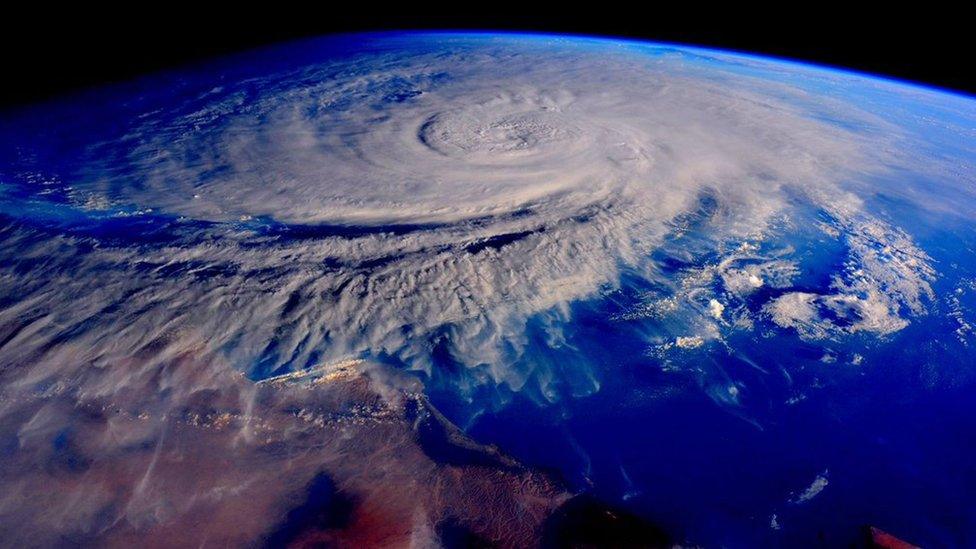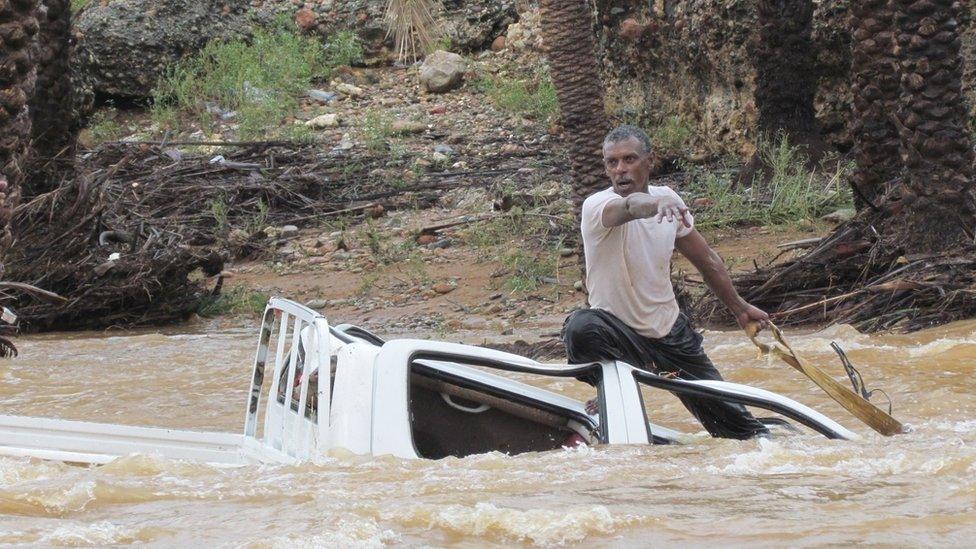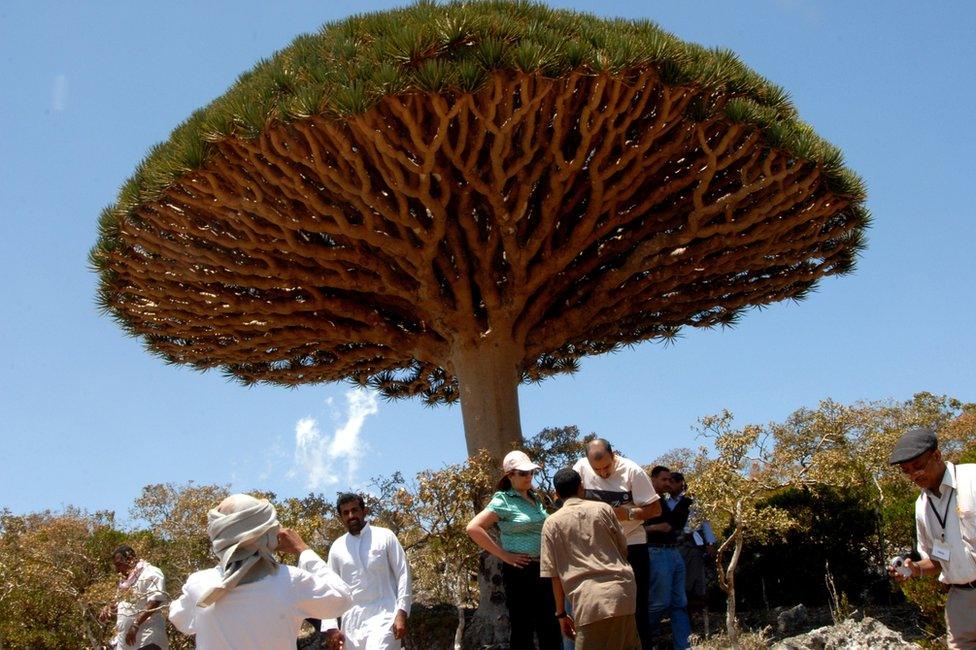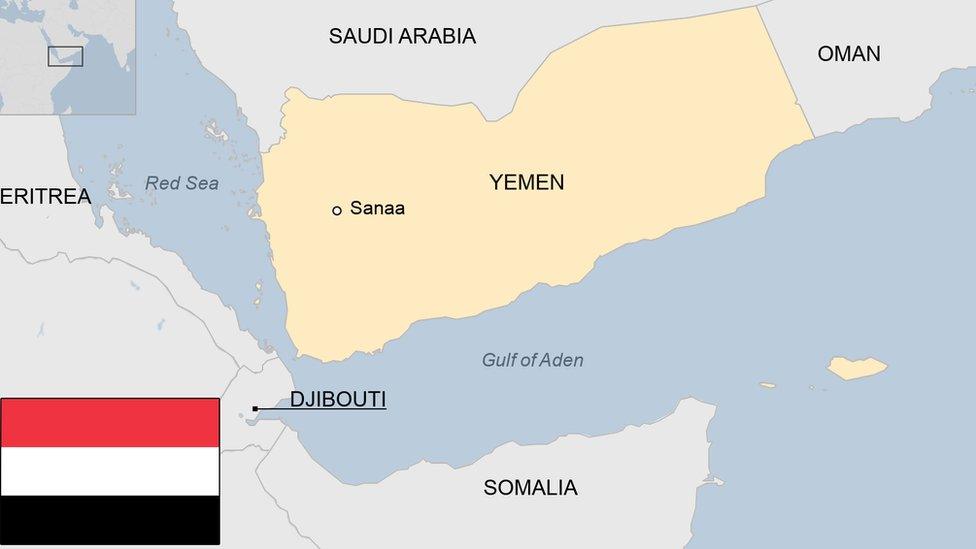Cyclone Chapala batters war-torn Yemen
- Published
Ahmed Al Junaidi shot this video of flooding in Shihr as Cyclone Chapala battered Yemen
A rare tropical cyclone has made landfall on Yemen's southern coast, flooding the port city of Mukalla.
Thousands fled as the storm, named Chapala, brought hurricane-force winds, heavy rain and huge waves to the area. There were no reports of casualties.
Mukalla is controlled by militants from al-Qaeda and residents warned it was ill-equipped to deal with a disaster.
On Sunday, the cyclone battered the remote Yemeni island of Socotra, killing at least one person.
Chapala is believed to be the most powerful storm Yemen has seen in decades.
It comes as the country experiences a humanitarian crisis as a result of a war between forces loyal to the government and the Houthi rebel movement.
'Enormous damage'
At 09:00 GMT on Tuesday, the US Navy's Joint Typhoon Warning Centre (JTWC) reported, external that the cyclone was generating gusts of up to 167 km/h (103 mph) when it briefly made landfall west of Mukalla, before tracking back into the Gulf of Aden.
Cyclone Chapala makes landfall in Yemen
Hours later, Chapala hit the Yemeni coast again west of Balhaf, site of Yemen's liquefied natural gas terminal, and was expected to move west-north-westwards.
The JTWC said the storm system would rapidly decay over the next 24 hours due to the interaction with the rugged and dry terrain of Yemen's Central Highlands.
The cyclone could nevertheless deluge parts of the country with up to 50cm (20in) of rain in two days - 10 times the annual average.

A Nasa astronaut took a photo of Cyclone Chapala moving through the Arabian Sea on Saturday
Residents of Mukalla, the capital of Hadramawt province, told the Reuters news agency on Tuesday that the seafront promenade and many homes had been destroyed by the cyclone.
Water had submerged cars on the streets and dozens of families had fled a hospital because of the risk of rockslides, they added.
"The wind knocked out power completely in the city and people were terrified," one man said. "Some residents had to leave their homes and escape to higher areas where flooding was less."

Dozens of homes and vehicles on Socotra were damaged by water or swept away
Yemen's Fisheries Minister Fahd Kafain told the AFP news agency that Chapala had caused "enormous" damage and that he feared there would be fatalities.
The UN's World Health Organisation (WHO) said, external it had delivered trauma kits for 1,000 patients in Mukalla, which has been controlled by al-Qaeda in the Arabian Peninsula since April, and was providing fuel for hospitals and ambulances.
The effects of the cyclone, it added, would be felt over large parts of Yemen but were likely to be more severe in Shabwa and Hadramawt.
The provinces have a combined population of 1.8 million, including more than 100,000 internally displaced persons and 27,000 refugees and migrants.
Chapala earlier wreaked havoc on Socotra, situated 368km (230 miles) south of the coast of Yemen in the Arabian Sea.

Dragon's blood trees are a distinctive and slow-growing species native to Socotra
At least one person was killed and more than 200 were injured as the cyclone passed over the island, generating gusts of up to 240km/h (150mph) - equivalent to a category 4 hurricane.
The mayor of the provincial capital, Hadibu, told AFP that dozens of houses and hamlets were severely damaged or washed away.
Socotra is home to about 50,000 people and hundreds of exotic plant species found nowhere else, including dragon's blood trees.

Are you in Yemen? Are you affected? If you have any information to share with the BBC, you can email haveyoursay@bbc.co.uk, external.
Please include a contact number if you are willing to speak to a BBC journalist. You can also contact us in the following ways:
Whatsapp: +44 7525 900971
Send pictures/video to yourpics@bbc.co.uk, external
Tweet: @BBC_HaveYourSay, external
Send an SMS or MMS to +44 7624 800 100
- Published13 February 2024
